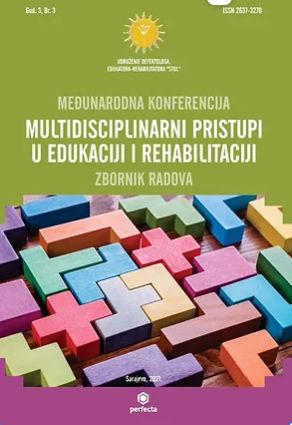PROGRAM RANE INTERVENCIJE-STAVOVI RODITELJA DJECE S TEŠKOĆAMA U RAZVOJU
EARLY INTERVENTION PROGRAM-ATTITUDES OF PARENTS OF CHILDREN WITH DISABILITIES
Author(s): Nermina Ibrahimović, Aida LičinaSubject(s): Social Sciences, Education, Preschool education, Inclusive Education / Inclusion
Published by: Udruženje defektologa, edukatora-rehabilitatora (STOL)
Keywords: early intervention; children with disabilities; parents of children with disabilities;
Summary/Abstract: Early intervention is the process of providing services and support to newborns, young children as well as to their families when a child has or is at risk of developmental delay, disability or health condition that may affect typical development and learning (ASHA). Effective early intervention programs also involve parents because the child development takes place mostly in a family setting. Parents are equal members of an early intervention team, who play an active role in making decisions related to the provision of available early intervention services. There is no single system of an early intervention in BiH whose operation is determined by law. The general goal is to obtain information from parents about the representation of early intervention programs through projects for children with disabilities in BiH. In line with this research goal, the following research questions were asked: availability of an early intervention programs in BiH and quality and effects of an early intervention services A survey was created for the purpose of the research, consisting of questions about demographic data and questions about parents’ attitudes about an early intervention program. The sample in the study consisted of 71 parents of children with disabilities. The results of the research showed that 78.9% (56) of parents were familiar, and 21.1% (15) were not familiar with an early intervention program. 77.5% of parents consider that an early intervention program contributes to the improvement of the child’s development, while 59.2% believe that an early intervention program improves the quality of life of the family. The results of the research show that children with disabilities are involved in various projects and institutions on which an early intervention is based. Also, most parents believe that existing early intervention services contribute to improving the child’s development and increasing the quality of life of the family.
Journal: Multidisciplinarni Pristupi u Edukaciji i Rehabilitaciji
- Issue Year: 3/2021
- Issue No: 3
- Page Range: 273-282
- Page Count: 10
- Language: Bosnian, Croatian, Serbian

